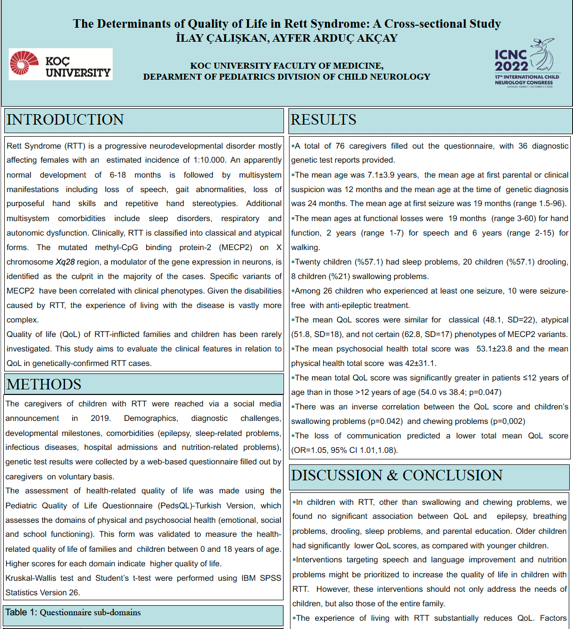The Determinants of Quality of Life in Rett Syndrome: A Cross-sectional Study
Ilay Caliskan, Ayfer Arduc Akcay
Objectives: This study aims to elucidate the clinical features and mutational variants affecting the quality of life (QoL) in Rett syndrome. Methods: The caregivers of children with Rett Syndrome were reached via a social media announcement in 2019. Demographics, diagnostic challenges, developmental milestones, comorbidities (epilepsy, sleep-related problems, infectious diseases and related hospital admissions, nutrition-related problems), and genetic test results were collected by a web-based questionnaire filled out on a voluntary basis by caregivers. The physical and psychosocial QoL was assessed by the PedsQL 4.0 Generic Core Scales. The descriptive statistics, Kruskal-Wallis test, and logistic regression analysis were performed by IBM SPSS Statistics Version 26. Results: A total of 76 caregivers filled out the questionnaire with 36 diagnostic genetic analysis reports provided for further analysis. The median age at first parental or clinical suspicion was 12 months while the median age at the time of final diagnosis was 24. Among 54 children who experienced at least one seizure, 20 were controlled with anti-epileptic management. Patients without a diagnostic mutation analysis were excluded from further comparative analysis. The difference between the mean QoL scores of classical (48.1, SD=22), atypical (51.8, SD=18), and not certain (62.8, SD=17) phenotypes of MECP2 variants was not statistically significant (p=0.102). The loss of communication milestone predicted a lower total mean QoL score (OR = 1.05, 95% CI [1.01, 1.08]). Conclusion: Interventions targeting speech and language development might be prioritized to increase the quality of life in children with Rett syndrome.
Keywords: Rett Syndrome, Quality of Life, Communication
Ilay Caliskan
Koc University School of Medicine
Turkey
Ayfer Arduc Akcay
Koc University Hospital
Turkey
Objectives: This study aims to elucidate the clinical features and mutational variants affecting the quality of life (QoL) in Rett syndrome. Methods: The caregivers of children with Rett Syndrome were reached via a social media announcement in 2019. Demographics, diagnostic challenges, developmental milestones, comorbidities (epilepsy, sleep-related problems, infectious diseases and related hospital admissions, nutrition-related problems), and genetic test results were collected by a web-based questionnaire filled out on a voluntary basis by caregivers. The physical and psychosocial QoL was assessed by the PedsQL 4.0 Generic Core Scales. The descriptive statistics, Kruskal-Wallis test, and logistic regression analysis were performed by IBM SPSS Statistics Version 26. Results: A total of 76 caregivers filled out the questionnaire with 36 diagnostic genetic analysis reports provided for further analysis. The median age at first parental or clinical suspicion was 12 months while the median age at the time of final diagnosis was 24. Among 54 children who experienced at least one seizure, 20 were controlled with anti-epileptic management. Patients without a diagnostic mutation analysis were excluded from further comparative analysis. The difference between the mean QoL scores of classical (48.1, SD=22), atypical (51.8, SD=18), and not certain (62.8, SD=17) phenotypes of MECP2 variants was not statistically significant (p=0.102). The loss of communication milestone predicted a lower total mean QoL score (OR = 1.05, 95% CI [1.01, 1.08]). Conclusion: Interventions targeting speech and language development might be prioritized to increase the quality of life in children with Rett syndrome.
Keywords: Rett Syndrome, Quality of Life, Communication
Ilay Caliskan
Koc University School of Medicine
Turkey
Ayfer Arduc Akcay
Koc University Hospital
Turkey

Ayfer Arduc Akcay
Koc University Hospital Turkey
Koc University Hospital Turkey